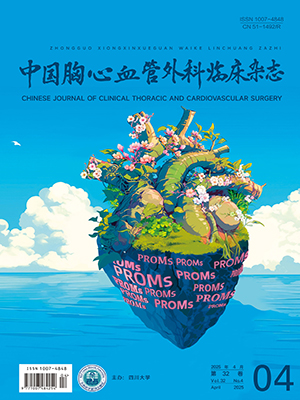| 1. |
陈翔, 葛均波. 经导管主动脉瓣置入术治疗严重主动脉瓣反流的研究进展. 中华心血管病杂志, 2015, 43(7): 639-641.
|
| 2. |
Flécher E. Valvular surgery before cardiac transplantation: The exception that proves the rule. Arch Cardiovasc Dis, 2020, 113(11): 671-673.
|
| 3. |
Leon MB, Smith CR, Mack M, et al. Transcatheter aortic-valve implantation for aortic stenosis in patients who cannot undergo surgery. N Engl J Med, 2010, 363(17): 1597-1607.
|
| 4. |
Smith CR, Leon MB, Mack MJ, et al. Transcatheter versus surgical aortic-valve replacement in high-risk patients. N Engl J Med, 2011, 364(23): 2187-2198.
|
| 5. |
齐喜玲, 许海燕, 刘庆荣, 等. 中国老年退行性心脏瓣膜病住院患者诊疗现状分析. 中国循环杂志, 2019, 34(8): 771-776.
|
| 6. |
Russell EA, Walsh WF, Tran L, et al. The burden and implications of preoperative atrial fibrillation in Australian heart valve surgery patients. Int J Cardiol, 2017, 227: 100-105.
|
| 7. |
孟庆童, 黄靖, 李源, 等. 主动脉瓣重度狭窄患者经导管主动脉瓣膜置换术后生活质量现状及影响因素分析. 中华现代护理杂志, 2019, 25(20): 2535-2539.
|
| 8. |
木巴拉克·依克拉木, 古丽苏木汗·阿布来提, 张翠萍. 多学科协作护理模式在乳腺癌患者中应用效果的Meta分析. 中国实用护理杂志, 2022, 38(2): 147-154.
|
| 9. |
和霞, 林梅, 杨清, 等. 我国多学科协作护理模式的应用现状. 天津护理, 2021, 29(3): 375-378.
|
| 10. |
Stern AF. The hospital anxiety and depression scale. Occup Med (Lond), 2014, 64(5): 393-394.
|
| 11. |
Hunt-Shanks T, Blanchard C, Reid R, et al. A psychometric evaluation of the Hospital Anxiety and Depression Scale in cardiac patients: Addressing factor structure and gender invariance. Br J Health Psychol, 2010, 15(Pt 1): 97-114.
|
| 12. |
Feng Y, Parkin D, Devlin NJ. Assessing the performance of the EQ-VAS in the NHS PROMs programme. Qual Life Res, 2014, 23(3): 977-989.
|
| 13. |
Asmarats L, Puri R, Latib A, et al. Transcatheter tricuspid valve interventions: Landscape, challenges, and future directions. J Am Coll Cardiol, 2018, 71(25): 2935-2956.
|
| 14. |
Bäz L, Wiesel M, Möbius-Winkler S, et al. Depression and anxiety in elderly patients with severe symptomatic aortic stenosis persistently improves after transcatheter aortic valve replacement (TAVR). Int J Cardiol, 2020, 309: 48-54.
|
| 15. |
Yu PM, Wang YQ, Luo ZR, et al. Postoperative pulmonary complications in patients with transcatheter tricuspid valve implantation-implications for physiotherapists. Front Cardiovasc Med, 2022, 9: 904961.
|
| 16. |
Caspi-Avissar N, Grosman-Rimon L, Gohari J, et al. Clinical, surgical, and sociopsychological gactors and depression after cardiothoracic surgery. Ann Thorac Surg, 2021, 111(3): 1064-1070.
|
| 17. |
Saint-Pierre C, Herskovic V, Sepúlveda M. Multidisciplinary collaboration in primary care: A systematic review. Fam Pract, 2018, 35(2): 132-141.
|
| 18. |
李蒙, 梁茜, 郭辉, 等. 护理多学科协作模式联合信息化血糖管理在虚拟病区围术期高血糖患者中的应用. 中华现代护理杂志, 2020, 26(23): 3210-3217.
|
| 19. |
应朝晖, 胡泽盈. 多学科团队协作护理模式在脑转移瘤手术患者中的应用效果研究. 护士进修杂志, 2018, 33(14): 1257-1260.
|
| 20. |
张密, 潘宝莹, 黎淑玲, 等. 多学科协作护理模式在乳腺癌围手术期患者中的应用. 现代临床护理, 2016, 15(8): 24-27.
|
| 21. |
吕建萍, 丁淑芳, 周志庆, 等. 多学科合作延续护理对慢性阻塞性肺疾病患者生命质量的影响. 中国实用护理杂志, 2015, 31(22): 1657-1661.
|
| 22. |
欧阳梅, 刘玲, 刘雯, 等. MDT协作护理在急性胆囊炎手术患者中的效果研究. 中国当代医药, 2017, 24(32): 189-191.
|
| 23. |
许祖存, 李静, 胡新春, 等. 护士主导的多学科协作干预对外科术后静脉血栓栓塞症的预防效果. 中国实用护理杂志, 2020, 36(7): 495-500.
|
| 24. |
吴世雯, 曾修碧, 王月, 等. 医养结合机构内多学科专科护士团队在老年脑卒中后风险管理中的作用. 现代医药卫生, 2020, 36(1): 124-127.
|
| 25. |
郑红宇, 姬秀红, 李莉. 多学科团队及综合评估在老年肿瘤患者护理中的应用现状. 天津护理, 2019, 27(4): 500-502.
|
| 26. |
Mathis MR, Duggal NM, Likosky DS, et al. Intraoperative mechanical ventilation and postoperative pulmonary complications after cardiac surgery. Anesthesiology, 2019, 131(5): 1046-1062.
|
| 27. |
Boden I, Robertson IK, Neil A, et al. Preoperative physiotherapy is cost-effective for preventing pulmonary complications after major abdominal surgery: A health economic analysis of a multicentre randomised trial. J Physiother, 2020, 66(3): 180-187.
|
| 28. |
Nishimura RA, Otto CM, Bonow RO, et al. 2017 AHA/ACC focused update of the 2014 AHA/ACC guideline for the management of patients with valvular heart disease: A report of the American College of Cardiology/American Heart Association Task Force on clinical practice guidelines. Circulation, 2017, 135(25): e1159-e1195.
|
| 29. |
刘柳, 汪婕, 任玲俐. 多学科协作护理模式对原发性肝癌术后复发患者自我感受负担及生活质量的影响. 天津护理, 2021, 29(3): 292-295.
|




